Crossing at Christmas unusual, as usual
Though the Crossing's up-to-the-minute repertoire often radically redefines what you thought music could do, this concert was counterrevolutionary.

The reward for navigating Friday's icy streets was the candlelit coziness at the Crossing@Christmas concert in the Church of the Holy Trinity on Rittenhouse Square – and the place was packed. The Philadelphia Chamber Music Society made this new-music choir its primary Christmas offering, though the Crossing repeats Friday's program on Sunday at its own Presbyterian Church of Chestnut Hill concert series. Yet another manifestation of the Crossing's growing place in the world is its recent Grammy Award nomination – this for a group that filled no existing niche when formed here 12 years ago.
Yet the Crossing and its founder, Donald Nally, remain a moving target. Though its up-to-the-minute repertoire often radically redefines what you thought music could do, this concert was counterrevolutionary. Nothing on the surface would rock anybody's boat. Some hardcore new-music types might be let down by this meticulously composed, 70-minute, intermission-less concert of 12 like-minded pieces that unfolded in a continuous stream. Solo violin and piano interludes were heard between sung pieces, ancient chants were refitted with modern poetry, and ideas were explored around accepting love – and the inevitable loss that's built into it – amid contemplation of Christ's birth.
Familiar composer names included Gabriel Jackson, Gavin Bryars, Joby Talbot, and Toivo Tulev – all distinct personalities, though the choice of pieces fell into certain patterns. Some were choral songs with sophisticated lyricism. Others were simpler lullabies or carols, such as Jonathan Varcoe's version of Lullay, Lullay, Little Child. Returning by Michael Gilbertson Jr. had the Biblical figures of David and Jonathan communing with each other from beyond the grave – and effectively employed the kind of eloquently hesitant narrative manner of David Lang's Little Match Girl Passion. Gilbertson's other contribution was a world premiere dedicated to Nally's late mother, titled Born, that encapsulated the concert's ongoing birth and death themes in a compelling fusion of new and ancient compositional techniques.
But the actual performance – with the Crossing singing at its usual high standard – left one's typical listening skills useless. If your starting point in digesting new music is the piece's title and author, the dim lighting in the church didn't allow you to check your program while listening. You weren't sure what you were hearing, particularly with the addition of chants and instrumental interludes. Though there were surtitle translations of foreign-language texts, listeners were cast adrift from analytical perception – and the preconceived notions that come with it. No external framing. Because the concert's sequencing and manner flowed so easily, questions about what you were hearing faded within the opening seconds of each piece. The concert couldn't even be photographed due to low lighting levels – and that included curtain calls. You were seduced into a purely intuitive experience.
With none of the typical aural filters, you had to have faith – in the selection of the music, the order in which it was sung, the singers giving it to you, and the overall atmosphere of the church. And isn't faith the core meaning of Christmas?
davidpatrickstearns@yahoo.com